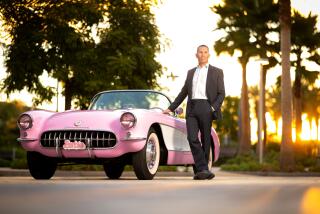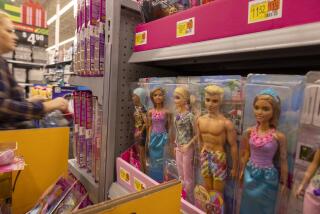Challenging Round for Applause : Owners’ financial woes, market shifts could undermine successful Woodland Hills gift and novelty company.
- Share via
Applause Inc.’s slogan this year is “Breakin’ Away in ‘89,” and Applause President Robert G. Solomon calls it a “battle cry” to motivate the company’s 1,300 employees to sprint ahead of their competition.
But Applause’s race with its competitors this year may resemble a high hurdles contest more than a sprint. After three years in which it doubled in size, Applause is facing problems that could cause it to stumble if the company is not careful.
In the past five years, the Woodland Hills company has emerged as one of the nation’s largest gift and novelty companies. Last year, it sold about $200 million worth of stuffed toys and dolls, plastic figurines, key chains and decorative mugs, compared to sales of less than $100 million in 1986. The company’s products, which feature a logo showing a pair of clapping hands, are sold in 75,000 gift, card, florist and stationery shops nationwide.
One question about Applause concerns its ownership. In May, control of the company was bought by Avalon Marketing, a Los Angeles company that is itself controlled by the wealthy Thompson family of Dallas, for $92.5 million cash and stock worth $23.3 million.
The financial woes of the Thompsons, whose holdings include Southland Corp. and its 7-Eleven chain of convenience stores, have been making news for the past few months, with Fortune magazine recently calling their financial saga “The Texas Chain Store Massacre.”
The family borrowed about $5 billion to buy Southland in 1987 and has been selling the company’s assets furiously to pay down the debt. In addition, the Thompsons developed a 42-story Dallas office building called Cityplace Center that has been a financial disaster.
David Bowe, a vice president of Thompson Co. in Dallas, declined to comment about Applause or other Thompson investments. But some observers are asking whether Applause might be the next Thompson asset to be put on the block.
Not likely, said Dennis Telzrow, a retail analyst at Eppler, Guerin & Turner in Dallas, who has followed the Thompsons and developments at Southland. He said the family fortune is somewhat insulated from the problems at Southland, which was bought mostly with borrowed money.
“It’s not like (Dallas businessman) Bum Bright, who put the Dallas Cowboys on the block because had had a problem personally,” Telzrow said. “The Thompsons are not required to sell a lot of their (personal) assets because of what’s going on at Southland.”
Two-thirds of Applause’s business involves “plush toys”--cuddly stuffed animals and dolls. And that business softened dramatically last year.
According to figures compiled by the Toy Manufacturers of America, a trade group based in New York, sales of “traditional” plush toys, or low-tech stuffed animals and dolls without electronic gadgetry inside, plunged 44% to 94 million units last year, while the wholesale dollar value of such toys sold by manufacturers tumbled 30% to $596 million.
Also, gift company executives complain that increased competition from new manufacturers diluted the market as sales were slowing.
Robert E. McEntee, president of Applause’s rival Russ Berrie & Co in Oakland, N.J., said: “1988 was not a a great year for plush toys. A lot of people got into the business and saturated the market.”
Such a steep drop is puzzling because 1986 and 1987 were big years for plush toys. Toy and gift makers speculate that children and parents opted to spend money on video games and traditional toys such as Barbie dolls in lieu of stuffed animals and toys. They also blame department stores, which virtually gave away stuffed bears in sales promotions.
“They really crippled the market,” Applause’s Solomon said. “There’s no question everyone in the gift and toy industry felt a softening in the plush area.”
Solomon recognizes that the gift and toy business is not child’s play. So he responded by making what he calls a “left turn” in Applause’s business. Rather than get slaughtered in the market by producing “generic” products such as stuffed bears, he said, he aggressively went after the “licensed character” market, where he said demand remains strong.
Licensed characters are often cartoon characters, many of them made famous in movies, books or on television. Applause sells stuffed toys and figurines featuring Roger Rabbit, Mickey Mouse, E. T., the Smurfs, the California Raisins and Raggedy Ann. Coming later this year is a Batman doll, which Applause expects to be a hit product after a feature film, starring actor Michael Keaton, is released in June. (For more on Batman, please see the Marketing column, Page 6.)
Dolls and figurines representing licensed characters make up about 50% of Applause’s sales, with only 10% involving the “generic” stuffed animals and toys. Among its best-selling products lately have been California Raisins characters, based on the popular television commercials for the California Raisin Advisory Board in Fresno. The dancing raisins have brought Applause more than $25 million in fees and sales of toys in less than two years, Solomon said.
Some gift companies shy away from licensed characters. For one thing, the owner of the license typically gets 5% to 10% of sales. In addition, the public is fickle about such characters.
“Licensed products such as Roger Rabbit and Spuds MacKenzie come and go,” said McEntee, the Russ Berrie president, who nonetheless makes a stuffed toy based on the television character ALF.
Produced Overseas
Solomon said the characters are selected carefully and that he prefers “classic characters” that clearly have a long life span, such as Raggedy Ann and Walt Disney’s Mickey Mouse.
“We say no to licenses nine out of 10 times. We said no to the ‘Willows’ and the ‘Howard the Ducks’ of the world,” he added, referring to two recent films.
The stuffed toys and dolls that Applause sells are made in South Korea and China and typically sell in stores for less than $20. To protect Applause from big swings, Solomon said, the company makes sure that no more than 10% of Applause’s business will be based on any one product and that no more than 2% of its sales are from any one retailer.
Solomon, 36, started working as a salesman in 1975 for the company, when it was based in Van Nuys and known as Wallace Berrie & Co. Berrie, the brother of Russ Berrie, retired in 1982.
Applause later became a partnership owned by Solomon and two other men, Larry Elins, who is retired, and Harris Toibb, who serves as Applause’s chairman. Last May, Solomon was named president after working as executive vice president.
Solomon likes to use vivid metaphors when describing Applause. On a company videotape, he tells his 500-person sales staff that the retail business is like “Mt. Fuji.” Applause, he says, does not want to aim for the top of the mountain, where exclusive stores such as Tiffany & Co. are, or for the bottom, where he says one finds mass merchandise outfits such as K mart and Toys R Us. Instead, he says, he wants to be in the middle, where he finds such stores as Hallmark card stores and airport gift shops.
Applause is highly profitable, according to Securities and Exchange Commission documents filed by Avalon. In the fiscal year that ended last June 30, Avalon’s gift ware division, which is mostly Applause, had operating income of $28.7 million on sales of $191.2 million.
More to Read
Inside the business of entertainment
The Wide Shot brings you news, analysis and insights on everything from streaming wars to production — and what it all means for the future.
You may occasionally receive promotional content from the Los Angeles Times.










